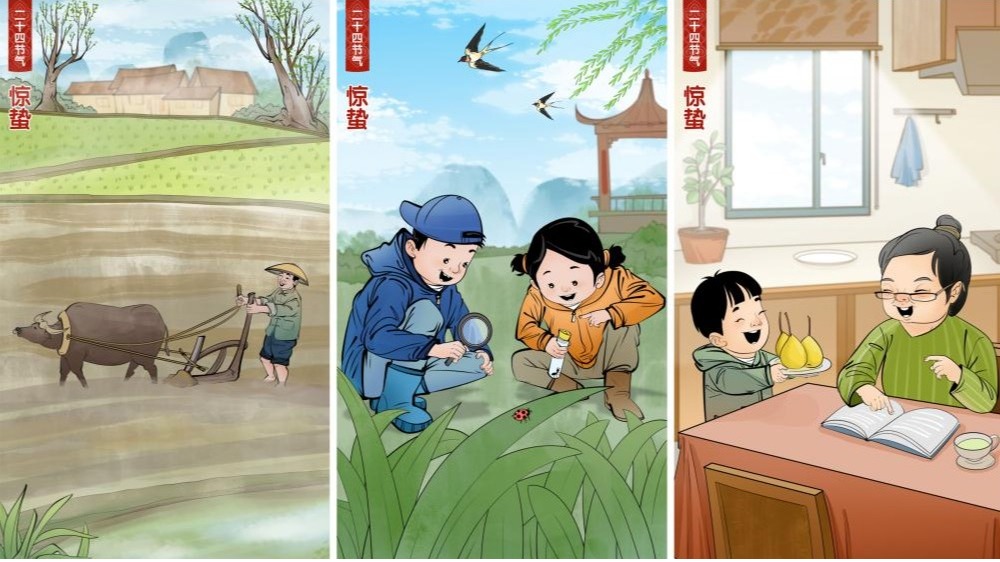A spring thunder rang out and everything on earth revived.
The Awakening of the Insects, known as "Qi Hibernation" in ancient times, is the third of the twenty-four solar terms, marking the beginning of the mid-spring season. In Xu Shen's Origin of Chinese Characters, the word "hibernation" is interpreted as "hiding". The Yuan Dynasty literati Wu Cheng compiled the "seventy-two lunar months" in this way: "spring thunder woke up the hibernating insects," the ancients believe that the animals hide in the soil in the winter, do not drink and do not eat, when the spring thunder burst, the earth warmed up, they were awakened. In fact, this is mainly the result of temperature change.
Ancient literati loved to describe the Awakening of the Insects and left many poems that have been passed down through the ages.
A few lines of the interesting Viewing the Field written by Wei Yingwu of the Tang Dynasty said, "A spring rain fills everything with vitality, and a spring thunder announces the beginning of spring. Farmers can have a few days of free time, and they have to start laboring again since the hibernation. Young and strong people began to work in the fields again, and the fields were plowed in an orderly manner. When they returned from the fields, the sun had already set, and they had to lead their oxen to the spring in the west to drink water. The peasants never speak of hard work after their labors, and a spring rain can make them rejoice."
In a few lines, the poem paints a picture of farming in spring. At the first sound of spring thunder, the grass is just sprouting on the country road, and young and strong men are busy in a spring scene. They plow the land with oxen, tired but never complaining, and a precious spring rain makes them jump for joy.
Agriculture was very prosperous in the Tang Dynasty. The poet Yuan Zhen, who had been a prime minister valued agriculture much, he had written twenty-four poems about the seasons, which have been handed down to this day.
In ancient China, hibernation was divided into three parts: in the first part, the peach blossom begins to show its fragrance, in the second part, the oriole begins to chirp, and in the third part, the eagle begins to transform. Yuan Zhen's description of hibernation is very close to these three parts when he writes, "When hibernation arrives, everything begins to rise and develop its yang energy. Peach blossoms begin to bloom and eagles begin to change their feathers."
Light thunder startles spring, and everything begins to change, with the biting of the east wind, the warmth of spring light, and the scent of flowers and birdsong. Yuan Zhen slowly spreads the beautiful colors of spring between heaven and earth through his poetic language. It is as if you were there after reading it.
At the time of hibernation, there are a number of folk customs, and "driving out insects" is one of the more interesting ones. Because the spring thunder will wake up many insects, the people are worried that the snakes, insects, rats and ants will harm the crops or disturb their lives, so they will drive away the insects. The Thousand Golden Monthly Orders states: "On the day of hibernation, putting lime under the threshold of the door can kill insects and ants."
In folklore, there is also "eating pear in hibernation" folk custom. In traditional culture, it is taboo to eat pears on festivals. However, eating pears at this time signifies separation from pests and keeping away from diseases. As the saying goes, "cold hibernation, warm equinox", from the health point of view, mid-spring is still cold, easy to dry mouth, eat pears is benefit to spleen and stomach, can make the five organs calm, can strengthen the body, against the attack of germs.
In addition to poetry and folklore, the word "hibernation" has a lot of meaning when you read it carefully.
Xiao Fang, a professor at Beijing Normal University's School of Social Sciences, said that the evolution of the character for "hibernation" alone can tell us a little about the connotations of it. The character for "hibernation" in the small seal script is a coiled snake at the bottom, and the upper part of the character is meant to be bound and immobile. The upper and lower parts of the character together depict the hibernation state of insects from the bitter cold winter to early spring. When the thunder rumbles, it awakens the insects and also awakens hope. Between the changes of motion and stillness, all things on the earth are also vigorously developing after a winter's accumulation of strength.
It is mentioned in the Er Ya that "hibernation means stillness." As the ancients said, "The dragon and the snake hibernate to protect their bodies". There are always ups and downs in the world, so the ancients used to encourage themselves by saying, "A gentleman hides his weapon and waits for the time to move," meaning that people should change according to the situation. Sometimes, "hibernation" is to "surprise", need to "hibernate" when hiding themselves, in the "surprise" to show their sharpness, this is the hibernation of people. It is also an important survival wisdom and life philosophy that hibernation brings to people.
